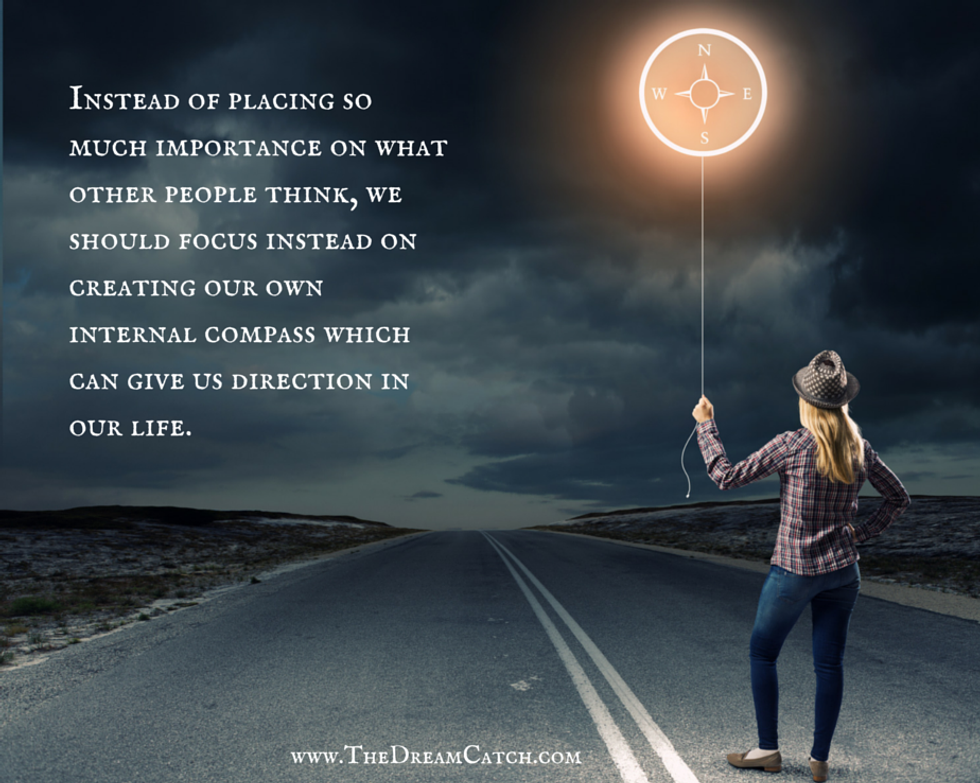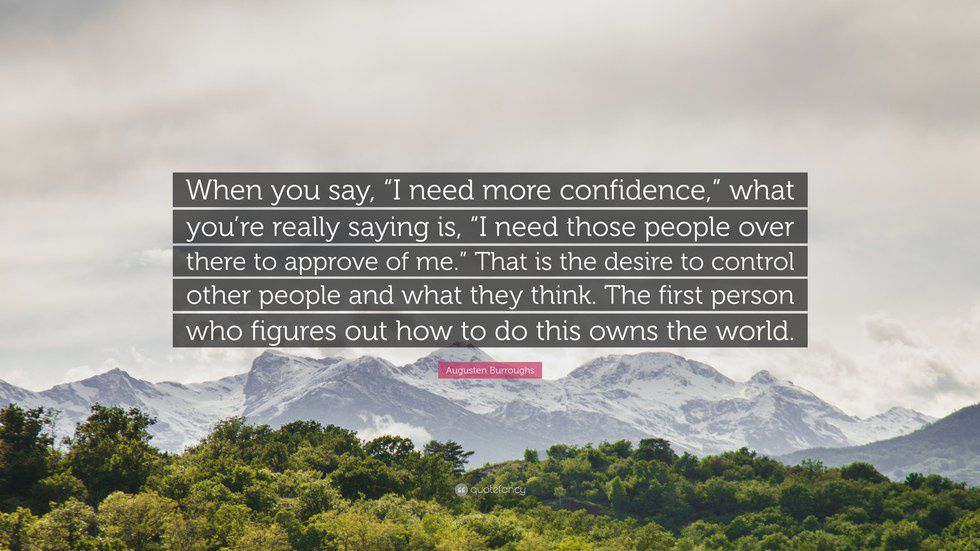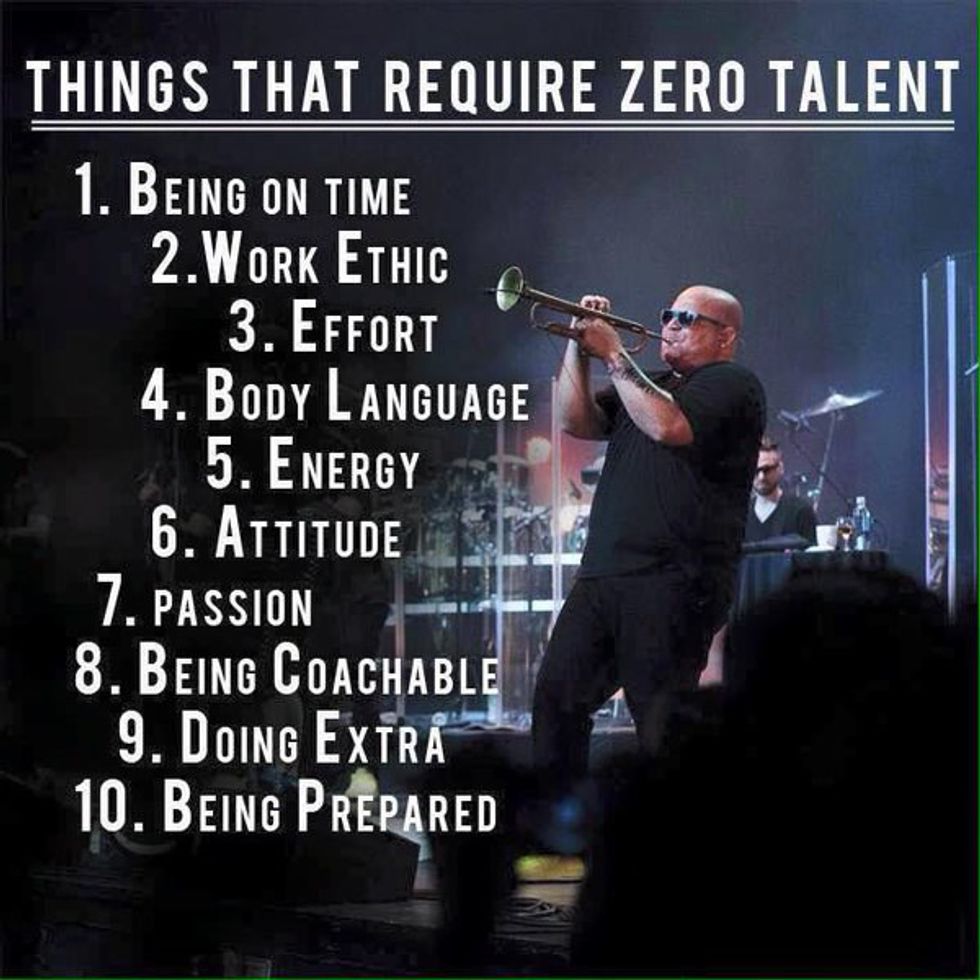I started doing colorguard when I was 15 because I wanted to learn how to spin flags. Never would I ever have considered myself a dancer. I wanted to avoid dance at all costs; dancing, in my mind, was just an opportunity for me to embarrass myself.
I'm enormously tall and uncomfortable about it, gay and lacking in self-esteem. Before I grew into even one of those three things, I was being asked to sauté, tourjouté and calypso my way to successful, beautiful body shaping. And all I could think was, "Wow, I probably look horrible right now."
"Point your feet!" my instructors would say. "Daniel! You look like a wounded baby giraffe! FIGURE IT OUT!"
I had no idea what I was doing.
The thing about looking horrible is that it implies someone else is looking at you. Dance is a visual activity meant to be seen by an audience; eyes are on the performer at all times. If any successful dancers spent all their rehearsal time and energy fearing what other people thought of them, they wouldn't be successful dancers at all.
"Hold up," you're probably thinking. "Of course dancers are concerned with what other people think of them. That's why so many ballerinas have eating disorders!"
Sure, you're not wrong, but that's not what I'm saying.
Let me put it another way: I only became any good at dancing once I stopped telling myself, "I'm not a dancer, I'm awkward, I'm gangly," and started simply focusing on the information I needed to be successful. When I focused less on looking foolish or feeling embarrassed about sticking out, I was better. And I learned quicker.
Have you ever started a new job and right out of the gate, you want to let them know they made the right choice in hiring you? Did you ever ask too many questions, take too much initiative that maybe you weren't supposed to?"Oh, let me take that," I would say in the restaurant business when the server I was training with would reach to start clearing a table. "I can run that," I'd say when they put up food to be expedited, trying to prove I knew the table numbers when 1 out of 3 times I'd run it to the wrong table in my first couple days of work.I'd been working in the service industry for a year already, but on one of my first days at a new place, I was running drinks on a busy night and practically ran around the bend to drop them off without saying "corner," (as is traditional in the biz to let folks know you're coming around the bend). I ran right into the manager while a woman's cranberry spritzer flew from my tray, splashing all over the floor in front of her.
Those mistakes wouldn't have happened if I didn't think I needed to prove myself. I was so worried about what they thought of me. There's nothing wrong with taking initiative, but sometimes you have to pump the breaks so you don't make rookie mistakes.
A lot of people think you need to have confidence or self-esteem to be successful. Those are all well and great but then we start looking at other people whom we admire and we window shop for success through them. "I don't have enough confidence; I want more of that," we say as we point to the Winter Olympics on TV, mesmerized by the figure skaters doing impossible featsWhat do you think they had to do? They had to work. That's why people train for the Olympics. And when they were training, you can bet there were times they wished they had more confidence, too. We're all mortals, aren't we? Some of us just happen to have a couple more years of practice under our belts. Others of us are privileged with a wealth of resources. And even others just have a thing called natural talent.
By measuring yourself up to an impossible standard, you're only going to come away thinking you have less of some magic pixie dust that will make you "good," "great," or even, "happy," or "successful."
Our failure isn't that we don't all have a secret stash of this magical pixie dust to give us self-esteem; our true kryptonite is our fear of work. It's work to be good at anything. Furthermore, we have a massive lack of knowledge on how to work.Whether you're learning something new or still trying to polish some old skills, there's a lot that's actually in your hands when you're trying desperately to be good at something. Here are some tips on how to work smart while you work hard:
1. How long will you let your mistakes haunt you?
An instructor in your dance class calls you out in front of the whole group. A fellow student in your studio painting class makes a harsh critique about your piece. Your boss pulls you aside at work and tells you to change something about your working habits, like how you write your emails or your phone mannerisms.
How will you respond? "Okay, thank you, I'll fix it," is typically a good stock response. If you start wallowing over the mistake you made, don't. Stop right there and nip it in the bud. So long as you fix it, it's likely that whoever your critic is will forget about your mistake in a week's time, even less. Cutting yourself off before you get to that head-space is a mental discipline and it takes practice. Refocus your energy into something within your control.
2. Practice really does make perfect.
When you stop obsessing over your mistakes, you have more time and energy to devote to actively pursuing your craft. Take a breath, collect yourself. See if you can do that fouetté turn without falling over. Send out another ten writing samples for prospective gigs. If someone gives you feedback, try and apply it. It might take 5 tries until you start to feel yourself doing something different. Even then, keep practicing, develop new, better habits. That's muscle memory. The neurons in your brain will literally form new connections that will make being good at whatever it is easier. Eventually, you'll know when to stop. You'll know that one extra split leap is just obsessive. Just leave it on a good one so you can feel confident when you do it in front of an audience.
3. Failure is the most instructive tool.
Seriously. You have to do it wrong a couple times before you learn how to do it right. Falling short is a great chance to assess your weaknesses. In the business world, they call them "Areas for Growth." Some strengths are natural while others have to be harnessed. You turn your weaknesses into strengths by caring less about the mistake you made after you already made it. My father once told me, "The rearview mirror is smaller than the windshield because it's what's coming at you that's important."
In order to be good at just about anything, you have to throw yourself into your craft and learn how to take the good and the bad while you keep your ego in check. Don't take yourself out of the race by measuring up to impossible standards. Keep yourself laser-focused on the goal and don't forget to put. in. the. work.
In the wise words of one of my former instructors, "Do the damn thing!"



























